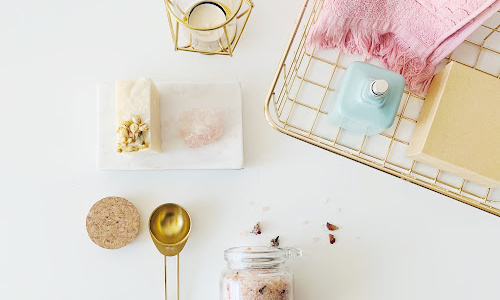In this post: Do you know how to build a simple self care routine? You can easily incorporate self-care into your daily routine without taking too much time out of your schedule.
I turned the key and locked the office door. The skies seemed like they were lit by the bright lights on the lamp posts.
As my feet hit the pavement, the gravel crunched underneath my feet as sauntered to my car.
I stifled a yawn as I sat behind the wheel. My energy was completely sapped. These extra hours, burning the candle at both ends cannot continue.
Something has to give. “When do I get time to take care of myself? “
Self-care is a necessity. It’s the foundation of a healthy, balanced life. But truth be told, creating a self-care routine can be overwhelming and intimidating especially if you’re busy and often struggle to find the time to make yourself a priority.
You do need a break from your hectic day-to-day life and taking some time for yourself can make a world of difference in terms of your mental and physical health.
Table of Contents
Exposing The Misconceptions Of Self Care

There are many common myths when it comes to self care. So let’s set the record straight, it’s actually a crucial ingredient in maintaining good physical, mental and emotional health.
Despite that, there are many misunderstandings about self care that can prevent you from fully adopting and benefiting from it.
Some of the myths are:
Myth #1. Self care is Selfish
In some quarters it’s touted that self care is selfish. But truth be told, that’s not the case at all.
As a matter of fact, it’s one of the building blocks for living a healthy and meaningful life.
When you take the time to build a self care routine, you’re taking the time to rejuvenate, renew and recharge your mind, body and soul.
This can help you to be more productive, balance your responsibilities and cope with life’s daily challenges.
Myth #2. Self care Only Involves Pampering

Self care is so much more than just getting a spa treatment or enjoying a luxurious bubble bath.
Even though these activities are clearly a part of self care, it’s all about taking care of all aspects of your well-being.
This includes your physical health, emotional well-being as well as nurturing your soul.
Myth #3. Self care Is A One-Time Thing
Here’s the thing, taking care of yourself is an ongoing process that continues throughout your lifetime, and should be integrated into your daily routine.
Whether it’s meditating or praying, taking a few deep breaths or practicing mindfulness it’s important to make self care a habit.
Myth #4. Self care Has To Be Expensive
Caring for yourself doesn’t have to be expensive. In fact, some of the best self care activities are free such as journaling, taking a walk in nature, or going to the beach.
It’s about finding what works for you and what makes you feel good, regardless of the cost.
Myth #5. Self care Is A Sign Of Weakness
Taking care of yourself is not a sign of weakness, but rather a sign of strength.
It takes courage and determination to choose yourself first and make time for you in a world with endless demands.
How Do You Start A Basic Self care Routine?
Starting a self care routine can feel overwhelming, but it doesn’t have to be complicated at all.
You’ll need to treat it as an important obligation, just like your job or other responsibilities.
The key is to make it a priority and take small steps. When you can focus on yourself and prioritize self care activities, this will help you make it a habit.
Listen to your body and as you get more comfortable with these activities you can add more to your routine.
How To Build A Simple Self Care Routine?

It’s important to remember that your self-care routine should be tailored to fit your needs.
Making these practices a habit, they will help you take better care of yourself mentally, physically and emotionally and spiritually.
This allows you to live your life feeling energized, confident, and in control.
Here are some simple ways to help you better grasp what self care is all about and how you can use it to improve your life.
1. Establish Your Objectives
The power of setting your intention is often underestimated when it comes to self-care.
Taking a few minutes each day to establish your objectives and focus on what you want can help keep you motivated, positive, and on track with what you want to do.
So you need to identify what self care means to you. Ask yourself what is the purpose of your self care routine and why do you want to practice it?
What specific areas of your health and well-being do you need to focus on?
These simple questions can help guide you and keep you focused on what’s important.
They will also help to clarify the purpose and focus of the activities that you engage in. And, align them with your values, goals, and desired outcomes.
Additionally, when you have a clear objective it can also help prioritize self-care activities and make it easier to stick to the routine amid other competing demands.
2. Start Small
Start with something small and basic, like taking five minutes self care each day to listen to calming music or to pray and meditate.
Even something as simple as taking five deep breaths can help you reset and relax your body. These baby steps are enough to make a huge difference in your mental health.
So, don’t let yourself get overwhelmed by thinking too big right away. Just be consistent.
Related: 5-minute self care
3. Set Aside Time Each Day

After you’ve mastered the small steps, then you’ll add the next level. This is making sure that you dedicate at least 30 minutes per day to yourself which can be incredibly beneficial.
This could include reading a book, taking a long walk, journaling, or whatever else helps you relax and recharge after a long day.
Having this dedicated “me” time will ensure that you are taking care of your needs instead of always putting them on the back burner.
4. Set Realistic Goals
A crucial part of self care is taking time to focus on your mental health and setting realistic goals.
Creating realistic goals is key when it comes to building a successful self-care routine.
Start by setting goals that are achievable within the next week or month and grow from there. When you set unrealistic goals, it can lead to feelings of failure and disappointment if they aren’t met.
This will only cause you more stress rather than reducing them.
5. Plan Ahead
Planning ahead is one of the most important steps when you’re creating a self-care routine. Take some time each week to plan out your upcoming activities and events.
Doing that can help to reduce stress and give you peace of mind knowing that everything is dealt with.
Plus, having everything planned out makes it easier for you to carve out time for yourself during the week.
6. Be Flexible

Life throws curveballs at us every day, so it’s important that you’re flexible with your self-care routine.
For instance, if one day you don’t have time for your workout because you have an important meeting, don’t beat yourself up about it.
You can always make up for lost time later in the week or even the next day.
Being flexible will help keep your stress levels low and allow you to adjust easily when something unexpected crops up.
7. Treat Yourself
It doesn’t hurt to treat yourself every now and then. You don’t have to wait until the weekend or special occasions to do so.
Take some time during the week to indulge in something special, just for you.
Whether it’s getting an extra hour of sleep, going shopping with friends, sipping on your favorite tea, or even pampering yourself with some beauty treatments, you know you deserve it.
What Are Some Examples Of Self Care?

Having a Self care routine helps you to maintain a balanced life. It helps to prevent burnout and promotes overall happiness.
Developing a simple self care routine can involve activities such as:
- Exercise and physical activity, such as yoga, walking, or jogging.
2. Proper nutrition and hydration through healthy eating and drinking enough water.
3. Quality sleep, aiming for 7-9 hours per night and establishing a relaxing bedtime routine.
4. Mental health practices, such as therapy, mindfulness, or journaling.
5. Engaging in hobbies and interests, such as reading, painting, or playing music.
6. Spending time in nature and enjoying outdoor activities.
7. Taking breaks from technology and limiting screen time.
8. Practicing self-compassion and positive self-talk.
9. Seeking support from friends, family, or a support group.
10. Practicing good hygiene, such as taking showers, brushing teeth, and washing hands.
11. Getting a massage or practicing other forms of physical therapy to relieve tension.

12. Seeking professional help if necessary, such as for mental or physical health issues.
13. Engaging in acts of kindness and service to others.
14. Taking time to reflect and meditate on your thoughts and emotions.
15. Managing stress through techniques such as deep breathing or aromatherapy.
16. Making time for self-reflection and journaling to better understand your thoughts and feelings.
17. Pursuing creative pursuits like writing, photography, coloring, or cooking.
18. Planning and taking vacations or trips to new places to reduce stress and refresh your mind.
19. Seeking help from a financial advisor or creating a budget to reduce financial stress.
20. Engaging in activities that bring joy and laughter.
21. Practicing gratitude and appreciating the good things in life.
Conclusion On Build A Simple Self Care Routine
Self-care is incredibly important but sometimes can be difficult to prioritize in your busy life. It doesn’t have to be hard or take up lots of extra time each day.
All it takes is dedication and planning ahead so that you are able to prioritize yourself amidst your hectic schedule.
With some patience and flexibility, you can create an effective self-care routine that helps reduce stress and promote overall well-being.
Do you have a self care routine? Comment below!
Frequently Asked Questions (FAQs)
Why Is Self Care Important?
Self-care is the conscious choice of taking care of your physical, mental, emotional and spiritual well-being.
It’s important because it helps you recharge, manage stress, and improve your overall health and happiness.
How Can I Make Self Care A Daily Routine?
To make self-care a daily routine, try to schedule time for it in your calendar.
Make it a priority, and incorporate activities that you enjoy and make you feel good.
Start small and gradually increase the frequency and duration of your self-care activities.
What Are Some Simple Self Care Activities?
Simple self-care activities include things like:
- stretching
- deep breathing
- taking a bath
- reading a book
- spending time in nature
- listening to music.
- soaking up some sun
You can also try meditation, journaling, or practicing gratitude. The key is to find activities that work for you and make you feel relaxed and refreshed.
How Much Time Should I Set Aside For Self Care Each Day?
The amount of time you set aside for self-care depends on your schedule and personal preferences.
Some people find 10-15 minutes a day to be enough, while others may prefer to dedicate an hour or more.
It’s important to find a balance that works for you and allows you to regularly place your well-being at the top of the list.
How Can I Make Self Care A Sustainable Habit?
To make self-care a sustainable habit, try to make it a non-negotiable part of your daily routine.
Find ways to spend your time that bring you joy, and remind yourself of the benefits of self-care.
Also, take things in stride, try to be patient and forgiving with yourself, and remember that building a self-care routine takes time and effort.
How Do I Choose The Right Self Care Activities For Me?
When choosing self-care activities, it’s important to consider what makes you recharge, feel relaxed, refreshed, and rejuvenated.
Experiment with different activities to find what works best for you, and don’t be afraid to try something new if you feel like your routine has become stale.
How Can I Make Self Care A Priority When I Have A Busy Schedule?
To make self-care a priority when you have a busy schedule, try to schedule time for it in your calendar.
Prioritize it over other less important tasks, and make the most of your downtime by incorporating self-care activities into your daily routine.
Plus, try to delegate or outsource tasks to free up more time for self-care.
How Can I Hold Myself Accountable For My Self Care Routine?
To hold yourself accountable for your self-care routine, try setting goals and tracking your progress.
Enlist the support of a friend or loved one, or find an accountability partner who is also focused on self-care.
On top of that, try to be mindful of the benefits of self-care, and remind yourself why it’s important to prioritize your well-being.























